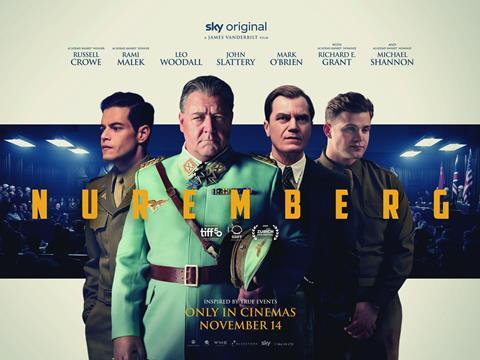Nuremberg
Director, James Vanderbilt, 2025
★★★★✩

The groundbreaking Nuremberg war crimes trials that followed the defeat of Nazi Germany have near mythical status in international law. The version that tends to stand accords with war correspondent Martha Gelhorn’s reports from the trials, which portray the proceedings, and in particular the voice of British judge Geoffrey Lawrence, as a representation of the decency and balance that the world yearned to return to.
In the latest dramatization of the trial of the Nazi leaders, the film Nuremberg, starring Russell Crowe as Hermann Goring, takes a different approach. It centres on encounters between Goring and Army psychiatrist Douglas Kelly, played by Rami Malek. The key lawyers are US chief prosecutor justice Robert Jackson (played by a square-jawed and belligerent Michael Shannon), and British barrister and Conservative MP David Maxwell-Fyfe KC (Richard E Grant).
There is reviewer-consensus that Crowe excels as Goring – self-important narcissist, convinced until the end that he can best the situation through his own cunning. Opinion divides on Malek’s portrayal of Kelley, assigned to assess defendants’ fitness for trial and to watch for signs of suicidal intent.
The Guardian’s review called Malek’s performance ‘deeply silly’. In fact, his performance I found to be of a piece with the drama’s portrayal of the trial and its context as a surprisingly dicey, at times contradictory, affair.
The trial is held in a repaired space in a Nuremberg shattered by allied bombing. Goring and his colleagues must be kept alive so they can hang. Jackson moves mountains to get to the point of an international tribunal supported by all the victorious powers. (‘Did you just blackmail the Pope?’ a colleague asks him. ‘I don’t want to talk about it,’ Jackson replies.)
Jackson wants a fair trial, yet Goring has to hang. Footage of liberated concentration camps, the starving and the dead, were shown at the trial and are included here. They never cease to shock.
And yet, the film highlights a point that dogs all war crimes tribunals that have followed. How do you link atrocities committed to those in command? What if there is no direct order, but everyone knows what the leaders desire, then carry out that will? Such layers of separation are a challenge.
Jackson induces Kelley use his position of trust to ascertain what his patient Goring’s defence will be. It’s a questionable request from someone insisting on the justice of a trial. ('Why don’t you just shoot them?’ Kelley asks him.)
As happened at Goring’s trial, the film shows Jackson’s difficulty in proving the link. It’s left to Maxwell-Fyfe to step in and save the cross examination. If Goring knew what he knows now about the extermination camps, Maxwell-Fyfe asks, would he still have followed Hitler? Goring confirms he would.
At two hours, 28 minutes, this is a fairly long film. Yet perhaps not quite long enough to fully explore one of its themes – the nature of evil and its causes. Crowe plays Goring not as a pantomime villain, but a narcissist – a fanatic nevertheless capable at times of emotional intelligence. He’s a monster who wants Kelley to teach him a magic trick that disappears a coin.
In stressing at the end of the film Kelley’s own belief that the deeds of Nazi Germany are repeatable in America, or any country, given the right conditions, the film strikes a note of contemporary relevance. The film closes on a quote from philosopher RG Collingwood: ‘The only clue to what man can do is what man has done.’ That’s not overly laboured though – the film naturally leads up to it.
For myself, I’d love to watch Nuremberg again – I’m sure there are things I missed, and I intend to do some further reading on the trials.




































No comments yet